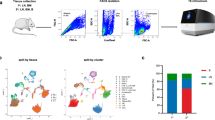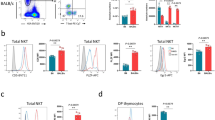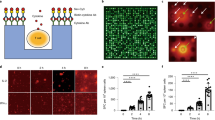Abstract
Cellular interactions between alloreactive cytolytic T lymphocytes (CTLs) and helper T cells have been suggested by the results of experiments in which lymphocyte subpopulations were defined by antisera against cell-surface markers1 or by differential response to antigenic stimulation2,3. The development of T-cell cloning technology has allowed the isolation of alloreactive cloned helper and cytolytic cells, and the demonstration of collaboration between them in the generation of cytotoxicity4,5. Whereas some types of alloantigen-specific cloned T cells, including helper cells, proliferate in tissue culture in response to antigenic stimulation4–6, CTLs isolated thus far do not and require for proliferation the addition of exogenous T-cell growth factors (TCGFs) or helper cells which produce TCGF in response to antigenic stimulation4,5,7–10. We demonstrate here, at the clonal level, the existence of another type of CTL which proliferates in response to allogeneic stimulating cells without the overt addition of TCGF; it produces helper-like factor and thus can be characterized as a helper cell-independent CTL.
This is a preview of subscription content, access via your institution
Access options
Subscribe to this journal
Receive 51 print issues and online access
$199.00 per year
only $3.90 per issue
Buy this article
- Purchase on Springer Link
- Instant access to full article PDF
Prices may be subject to local taxes which are calculated during checkout
Similar content being viewed by others
References
Cantor, H. & Boyse, E. A. J. exp. Med. 141, 1390–1399 (1975).
Bach, F. H., Bach, M. L. & Sondel, P. M., 259, 273–281 (1976).
Alter, B. J. et al. J. exp. Med. 143, 1005–1014 (1976).
Glasebrook, A. L. & Fitch, F. W. Nature 278, 171–173 (1979).
Glasebrook, A. L. & Fitch, F. W. J. exp. Med. 151, 876–895 (1980).
Fathman, C. G. & Hengartner, H. Proc. natn. Acad. Sci. U.S.A. 76, 5863–5866 (1978).
MacDonald, H. R. et al. Immun. Rev. 51, 93–123 (1980).
von Boehmer, H. et al. Eur. J. Immun. 9, 592–597 (1979).
Nabholz, M., Engers, H. D., Collavo, D. & North, M., 81, 176–187 (1978).
Baker, P. E., Gillis, S. & Smith, K. A. J. exp. Med. 149, 273–278 (1979).
Ryser, J.-E., Cerottini, J.-C. & Brunner, K. T. J. J. Immun. 120, 370–377 (1978).
Glasebrook, A. L. et al. Immun. Rev. 54, 226–266 (1981).
Cerottini, J.-C., Engers, H. D., MacDonald, H. R. & Brunner, K. T. J. exp. Med. 140, 703–717 (1974).
Brunner, K. T., Mauel, J., Cerottini, J.-C. & Chapuis, B. Immunology 14, 181–196 (1968).
Author information
Authors and Affiliations
Rights and permissions
About this article
Cite this article
Widmer, M., Bach, F. Antigen-driven helper cell-independent cloned cytolytic T lymphocytes. Nature 294, 750–752 (1981). https://doi.org/10.1038/294750a0
Received:
Accepted:
Issue Date:
DOI: https://doi.org/10.1038/294750a0
This article is cited by
-
T cell recognition of melanoma antigens in association with HLA-A1 on allogeneic melanoma cells
Cancer Immunology, Immunotherapy (1994)
-
The generation and activation of memory class I MHC restricted cytotoxic T cell responses to influenza A virus in vivo do not require CD4+ T cells
Immunology & Cell Biology (1989)
-
Cell-mediated cytotoxicity in down syndrome: impairment of allogeneic mixed lymphocyte reaction, NK and NK-like activities
European Journal of Pediatrics (1988)
-
Interleukin 2-induced recovery of natural killer activity in stress
Bulletin of Experimental Biology and Medicine (1986)
-
Interleukin-2 (IL-2) and its receptor
Medical Oncology and Tumor Pharmacotherapy (1986)
Comments
By submitting a comment you agree to abide by our Terms and Community Guidelines. If you find something abusive or that does not comply with our terms or guidelines please flag it as inappropriate.



